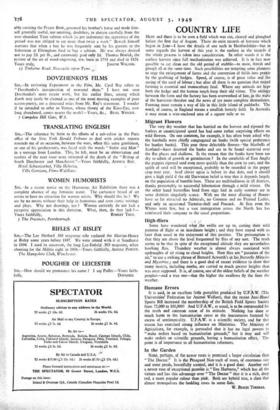Migrant Flowers The very dry weather that has hurried on
the harvest and ripened the barleys at unanticipated speed has had -some rather surprising effects on wild flowers. On one common, for example, it has often been asked why the harebells were chiefly congregated on banks (with special preferenCe for bunker banks). This year these delectable flowers--the bluebells of Scotland—have deserted the banks and are to be found scattered over the flat places and shallows. Is the reason that the banks have been too dry to admit of growth or germination ? In the cornfields of East Anglia the poppies ripened seed even more quickly than the corn its ears, and the spilth of seed will be exceptional, probably to be recorded in the poppy crop next year. Seed clover again is before its due date, and it should give a high yield if the old Darwinian belief is true that it depends largely on the population of bumble bees. These are multitudinous in all districts, thanks presumably to successful hibernation through a mild winter. On the other hand butterflies bred from eggs laid in early summer are in some districts singularly scarce. With me the most alluring of flowers have so far attracted no Admirals, no Commas and no Painted Ladies, and only an occasional Tortoise-shell and Peacock. At first even the Whites were few, but a vast immigration across the North Sea has reinforced their company to the usual proportions.


































 Previous page
Previous page